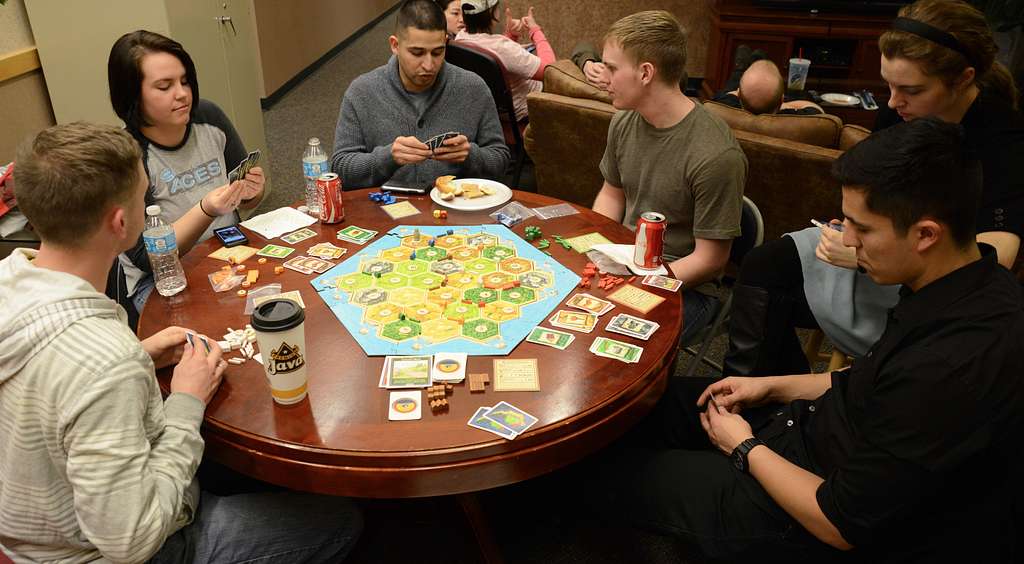Board games offer a rich tapestry of mechanics that enhance the gaming experience, and some of the most engaging are those that involve social interaction. In this blog post, we’ll explore three social board game mechanics: deduction, negotiation, and cooperative gameplay. Each section will provide a basic explanation of the mechanic and suggest four games that exemplify it. Whether you’re a fan of mystery, strategic bargaining, or teamwork, these mechanics offer exciting and immersive experiences.
Deduction Games
Deduction games are all about gathering clues, making connections, and solving puzzles. Players use logic and reasoning to uncover hidden information, often competing against each other or the game itself. These games create a sense of mystery and intrigue, challenging players to think critically and observe carefully.
Games featuring deduction:
- Sherlock Holmes: Consulting Detective: In this cooperative game, players work together to solve intricate mysteries by following leads, examining evidence, and piecing together clues. The game immerses players in the world of Sherlock Holmes, offering deep and satisfying detective work.
- The Resistance: This social deduction game pits a group of resistance fighters against hidden spies. Players must use logic and observation to uncover the spies while the spies try to sabotage the resistance’s missions. The game is tense and engaging, with plenty of opportunities for bluffing and deception.
- Mysterium: In this cooperative game, one player takes on the role of a ghost, giving clues to the other players who are mediums trying to solve a murder. The ghost can only communicate through abstract visions, challenging the mediums to interpret the clues correctly and solve the mystery.
- Clue (Cluedo): This classic game has players taking on the roles of detectives, moving around a mansion to gather clues and deduce who committed a murder, with what weapon, and in which room. It’s a staple of deduction games, offering a straightforward yet engaging experience.
Negotiation Games
Negotiation games emphasize social interaction and deal-making, requiring players to use their persuasive skills to achieve their goals. These games involve bargaining, forming alliances, and sometimes betraying others. The dynamic nature of negotiation games makes them highly interactive and strategic.
Games featuring negotiation:
- Catan: While known for its resource management, Catan’s negotiation aspect is crucial. Players trade resources to build roads, settlements, and cities, requiring strategic bargaining and deal-making to succeed.
- Cosmic Encounter: In this game, players take on the roles of different alien species, each with unique abilities. Negotiation is key as players form alliances, make deals, and sometimes backstab each other to control the galaxy. The game is known for its high replayability and social interaction.
- Chinatown: Set in 1960s New York, players negotiate and trade properties and businesses to complete sets and earn the most money. The game is all about strategic trading and deal-making, with each negotiation affecting the outcome.
- Diplomacy: A classic negotiation game where players control European powers before World War I. The game involves intense negotiation, alliances, and strategic planning, with no dice or cards involved. It’s a game of pure strategy and social interaction.
Cooperative Games
Cooperative games have players working together towards a common goal, fostering teamwork and collaboration. These games are ideal for groups looking to share in the victory (or defeat) and enjoy a collective gaming experience. Cooperative games emphasize communication, planning, and mutual support.
Games featuring cooperative gameplay:
- Pandemic: In this game, players work as a team of specialists to stop global pandemics. They must cooperate to treat infections, share knowledge, and discover cures before time runs out. The game is tense, strategic, and highly cooperative.
- Forbidden Island: Players are adventurers trying to recover treasures from a sinking island. They must work together to collect the treasures and escape before the island sinks completely. The game offers a fast-paced, cooperative challenge.
- Spirit Island: In this game, players are spirits defending their island from colonizing invaders. Each spirit has unique abilities, and players must coordinate their actions to repel the invaders and protect the island. The game is complex, strategic, and deeply cooperative.
- Gloomhaven: This epic dungeon-crawling game has players working together as a group of adventurers. They must navigate dangerous scenarios, make tactical decisions, and develop their characters over a campaign. The game offers rich storytelling and cooperative gameplay.
Conclusion
Board games with social mechanics like deduction, negotiation, and cooperative gameplay offer some of the most engaging and interactive experiences in the tabletop world. Deduction games challenge players’ logic and reasoning, negotiation games test their persuasive skills and strategic planning, and cooperative games foster teamwork and shared victory.
Understanding these mechanics can enhance your appreciation of the games that use them and help you discover new favorites. Whether you’re solving mysteries, striking deals, or working together to save the world, these social mechanics bring players closer together and create memorable gaming experiences. Happy gaming!


Leave a Reply